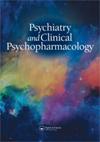Differentiating The Cognitive Impairment of Clinically Stable Schizophrenia from Mild Cognitive Impairment
IF 0.5
4区 医学
Q4 PHARMACOLOGY & PHARMACY
引用次数: 0
Abstract
Background: Cognitive deficit is common and considered as the core feature of both mild cognitive impairment (MCI) and schizophrenia. However, only a few studies have directly compared cognitive profiles of these two conditions. The objective of the study was to compare the cognitive profiles of patients with schizophrenia to those with mild cognitive impairment (MCI). Methods: Participants consisted of three groups; 42 normal controls, 42 patients with schizophrenia and 42 people with MCI. They were matched 1:1:1 with comparable educational levels. Cognitive functions were assessed using the Addenbrookes Cognitive Examination III. Results: Recall memory and naming subdomains were significantly lower in the MCI group as compared to patients with schizophrenia, but did not differ on attention, verbal fluency, clock drawing test, language and visuospatial ability. Logistic regression and diagnostic prediction model demonstrated that the MCI group is best differentiated from the schizophrenia group using recall memory and naming scores. Conclusions: The cognitive profiles in patients with schizophrenia and MCI are different. In this study, naming and recall memory were less impaired in patients with schizophrenia than in people with MCI. The results of this study might provide some clues for clinicians on how to distinguish between临床稳定型精神分裂症认知障碍与轻度认知障碍的鉴别
背景:认知缺陷是常见的,被认为是轻度认知障碍(MCI)和精神分裂症的核心特征。然而,只有少数研究直接比较了这两种情况的认知概况。该研究的目的是比较精神分裂症患者和轻度认知障碍(MCI)患者的认知特征。方法:参与者分为三组;42名正常对照,42名精神分裂症患者和42名轻度认知障碍患者。他们的受教育程度是1:1:1。认知功能评估采用阿登布鲁克认知测验III。结果:与精神分裂症患者相比,MCI组的回忆记忆和命名子域显著降低,但在注意力、语言流畅性、时钟绘制测试、语言和视觉空间能力方面无显著差异。逻辑回归和诊断预测模型表明,使用回忆记忆和命名分数可以最好地区分轻度认知障碍组和精神分裂症组。结论:精神分裂症与轻度认知损伤患者的认知特征存在差异。在这项研究中,精神分裂症患者的命名和回忆记忆受损程度低于轻度认知障碍患者。本研究的结果可能为临床医生提供一些关于如何区分的线索
本文章由计算机程序翻译,如有差异,请以英文原文为准。
求助全文
约1分钟内获得全文
求助全文
来源期刊

Psychiatry and Clinical Psychopharmacology
Medicine-Psychiatry and Mental Health
CiteScore
1.00
自引率
14.30%
发文量
0
期刊介绍:
Psychiatry and Clinical Psychopharmacology aims to reach a national and international audience and will accept submissions from authors worldwide. It gives high priority to original studies of interest to clinicians and scientists in applied and basic neurosciences and related disciplines. Psychiatry and Clinical Psychopharmacology publishes high quality research targeted to specialists, residents and scientists in psychiatry, psychology, neurology, pharmacology, molecular biology, genetics, physiology, neurochemistry, and related sciences.
 求助内容:
求助内容: 应助结果提醒方式:
应助结果提醒方式:


